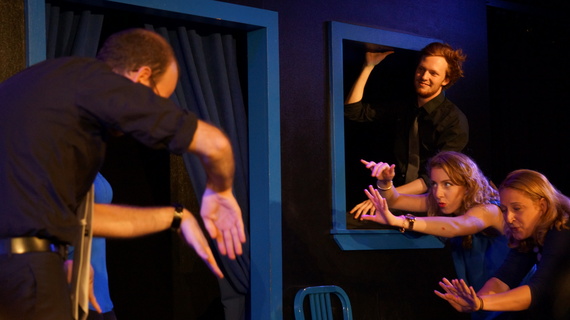A couple of suggestions from the audience... no props... and you're off and running. Improvisational comedy has been around for decades, and its popularity shows no sign of declining. One of the most successful exponents of improv is ImprovBoston, which has been around for decades and offers a wide range of performances and classes. I spoke with Mike Descoteaux, ImprovBoston's Artistic Director, to get a sense of how improv has evolved and what it means today.
Levin: How do you keep improv fresh when the genre has been around for so long?
Descoteaux: It's a form of comedy that is a direct reflection of the people who are exploring it. The culture is always new and fresh and is a reflection of where we are politically, where we are socially, where we are economically, and where we are as far as diversity of perspective goes. And all of that shows up on stage not just year-in-year-out but also night-in-and-night-out. What our audiences bring to the table, what our audiences suggest, how they respond, all of that keeps improvisation the single most relevant and timely form of comedy there is.
Levin: What has changed in society, and how is that reflected in improv?
Descoteaux: We have a much more permissive culture when it comes to what we can see up on stage. Improv now pushes past stereotypical comedic subject matter like how men and women are different. Now we might be exploring socioeconomic differences. We might be looking at political movements and reflecting those on stage.
Levin: Who is the audience for improv today?
Descoteaux: Everyone. At Improv Boston, if you look at our show schedule, we have everything from four o'clock shows for 4-year-olds all the way up to late night shows with standups performing naked and late night comedy exclusively for adults.
So there's a lot more range as far as who improv can connect with. In the early days of improv, the leaders were mostly middle-aged white men. Today, we're looking at a scene where the accessibility and diversity of comedy in improvisation is growing by leaps and bounds every year. Folks who haven't had a voice necessarily in comedy or specifically in improv are now finding the art form.
Levin: Who takes classes at ImprovBoston?
Descoteaux: If you come to an ImprovBoston 101 class, sure, you're going to have a handful of college grads looking to make a career in comedy. You're also going to have a 40-year-old immigrant who is learning to speak English fluently and is taking improv to improve her skills.
You're going to have someone who is in his 30s whose therapist recommended that he come take an improv class to get more socially acclimated. Or you're going to have a grandma whose grandkids bought them this gift because their grandma is the funniest person they know. I think that's a pretty big shift.
Levin: Are people as funny today as they were in the past?
Descoteaux: That's a fascinating question. I think people are as innately funny as they ever were. I think we have more tools to express that innate humor than we ever have. So our ability to connect with audiences is maybe greater than it used to be simply because we have more tools in the toolbox as comedians, as artists, as performers.
Levin: It's a lot easier to find comedy today than in the past. How does that change things?
Descoteaux: The exposure of our audiences to different forms of comedy is also growing. YouTube makes that so much easier. Forty years ago, when you wanted to see comedy, there was only really two ways to see it: you could see it live or you could see it on your TV in a very carefully curated cross-section of what mainstream television considered comedy to be.
Whereas now anyone with an internet connection can basically see absolutely any sort of comedy they want. So I think when we perform for audiences, they're more educated in terms of what kind of comedy exists now.
Levin: Did you say there are people performing nude at late night?
Descoteaux: I did. In addition to improvisation, Improv Boston features scripted comedy like sketch and stand-up. There's a long-running show at Improv Boston called Naked Comedy. It happens once a month on Thursday nights at 9:30, and it's for stand-up comics who are brave enough and feel compelled to deliver their set entirely in the buff.
Comics are baring their souls on stage every time they get on stage. It's a very vulnerable art form, so what's the way that we can take that vulnerability to its most extreme? It's comics who are willing to be naked in front of their audience and telling their stories, telling their jokes. It is a night unlike any other.
Levin: What's gained by performing in the nude?
Descoteaux: It's the ultimate risk to put yourself out there in that way. It's sort of the way I imagine bungee jumping--having survived it is the reward: putting yourself out there, taking that giant risk in front of 90 people you don't know and then making it to the end of your set and having made the whole audience laugh along with you. Usually about 30 to 40 seconds into any one set, you've almost forgotten that they're nude to begin with.
Levin: Almost.
Descoteaux: So it's really about breaking down barriers. It's opening themselves up to vulnerability. I think the artists who are successful in that go home feeling like they put themselves on the line. They laid it all out there, as it were.
For more information on ImprovBoston performances and classes, including Naked Comedy, visit www.ImprovBoston.com.

